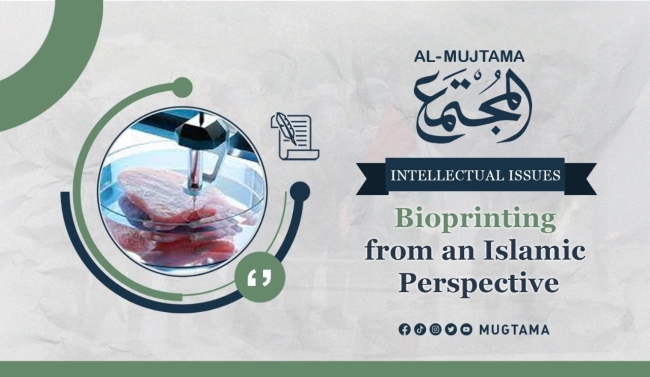Bioprinting from an Islamic Perspective Featured
Bioprinting, the process of creating three-dimensional living tissues and organs using 3D printers, has emerged as an exciting field of research with the potential to revolutionize healthcare. However, this cutting-edge technology raises important questions and challenges, particularly from an Islamic perspective. We will try to explore the ethical concerns and religious implications surrounding bioprinting, taking into consideration principles of human dignity, physical and spiritual wellbeing, social justice and fairness, and long-term consequences.
Challenges and Ethical Concerns
Respecting Human Dignity
Bioprinting involves manipulating human cells and tissues, raising concerns about the dignity and sanctity of human life. Islam emphasizes the inherent value and sanctity of life, from conception to natural death. The creation of human organs through bioprinting may be seen as an attempt to mimic or reproduce the divine act of creation, potentially undermining the sacredness of life.
Physical and Spiritual Wellbeing
In Islamic teachings, maintaining physical and spiritual well-being is of utmost importance. Bioprinting technology has the potential to enhance healthcare by providing replacement organs and tissues for those in need. However, it is essential to consider the possible impacts on the physical and spiritual well-being of individuals undergoing bioprinting procedures. Islamic scholars must assess the overall benefit and potential harm to individuals and society before endorsing such interventions.
Social Justice and Fairness
Bioprinting has the potential to create a divide between those who can afford advanced medical treatments and those who cannot. Islamic principles of social justice and fairness require that access to healthcare and medical advancements be equitable. There is a need to ensure that bioprinting technology is accessible to all, regardless of socioeconomic status. Islamic scholars and policymakers must strive to address these disparities and ensure fair distribution of resources and benefits.
Religious Implications
The field of bioprinting raises religious implications concerning the creation of life. In Islam, the creation of life is believed to be the exclusive domain of Allah (God). Creating organs through bioprinting may challenge this belief, as it involves human intervention in the process of creation. Islamic scholars must examine the theological implications and consult with experts in various fields to determine the compatibility of bioprinting with Islamic teachings.
Long-Term Consequences
While bioprinting holds immense promise for improving healthcare, there may be long-term consequences that need to be carefully considered. The widespread use of bio-printed organs and tissues may have unforeseen effects on individuals and society as a whole. Islamic scholars must assess the potential risks and benefits and weigh them against the principle of avoiding harm (do no harm) before endorsing and promoting the use of bioprinting technology.
Ethical Concerns
Bioprinting raises a host of ethical concerns that need to be addressed. These include issues related to consent, privacy, and the commodification of human organs. Ensuring informed consent and protecting the privacy of individuals involved in bioprinting procedures is paramount. Additionally, the commercialization and commodification of human organs through bioprinting must be carefully regulated to prevent exploitation and ensure ethical practices.
Bioprinting is a rapidly advancing field with the potential to transform healthcare. However, it is crucial to explore the ethical concerns and religious implications surrounding this technology. From an Islamic perspective, considerations of human dignity, physical and spiritual well-being, social justice and fairness, and long-term consequences are vital. Islamic scholars, policymakers, and experts from various fields must engage in thoughtful discussion and collaboration to navigate the ethical landscape of bioprinting and ensure it aligns with Islamic values and principles.


